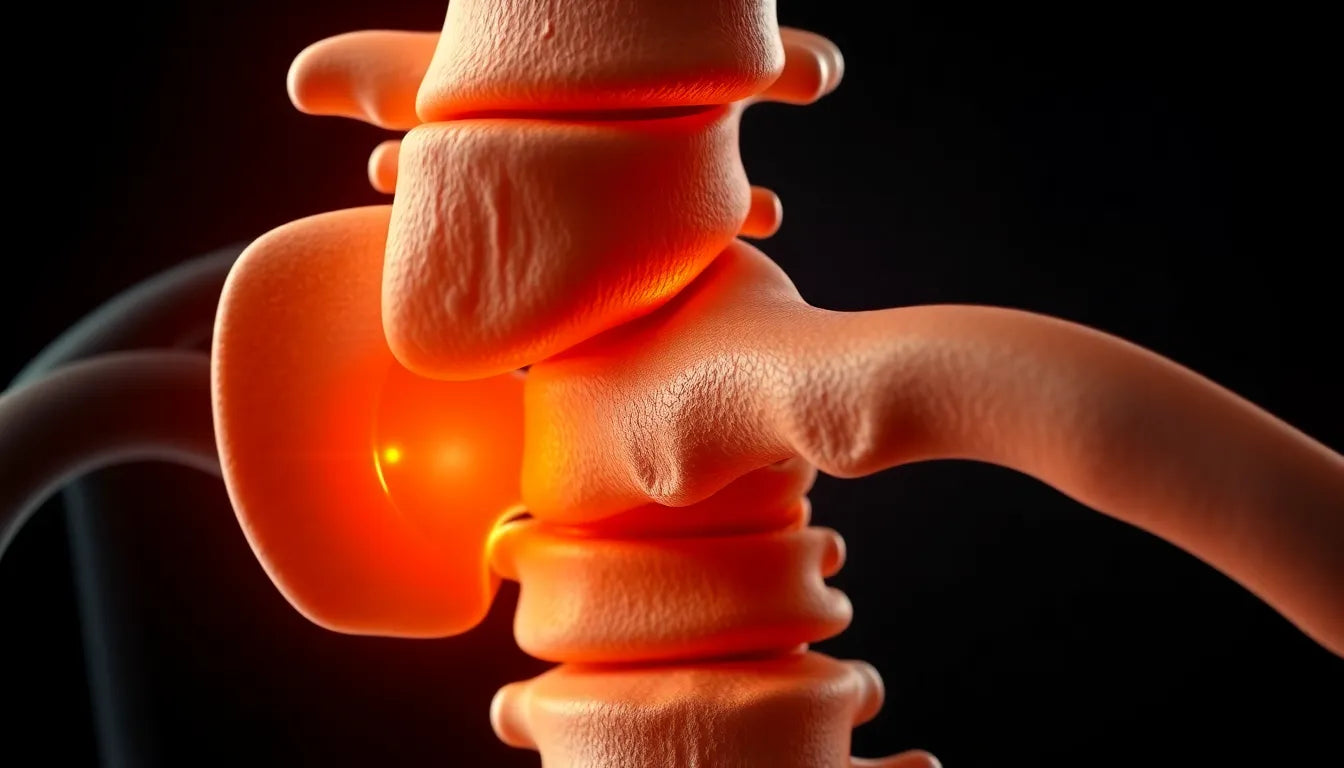Neck pain is a common ailment that affects many people, often disrupting daily activities and diminishing quality of life. Whether it's a dull ache or a sharp, persistent discomfort, neck pain can be a significant barrier to living comfortably. Among the various causes of neck pain, a herniated disc in the neck is a prevalent yet frequently misunderstood condition. This issue, involving the cervical spine, can lead to a range of symptoms that can impact your overall well-being.
Understanding the purpose of this post
This blog post aims to help you identify the key symptoms of a herniated disc in the neck. Recognizing these symptoms early is crucial because it allows for timely medical intervention, which can prevent further complications and improve your quality of life. By understanding the signs, you can seek appropriate care and potentially avoid chronic pain or more severe health issues.
What is a herniated disc?
A herniated disc occurs when the soft inner material of a spinal disc pushes through a tear in the tougher exterior. In the neck, this condition affects the cervical spine, which is responsible for supporting the head and facilitating a wide range of movements. The cervical spine is made up of seven vertebrae, and the herniation can occur at any level, leading to varying symptoms depending on the location and severity of the issue.
The symptoms of a herniated disc in the neck can differ significantly from person to person. Some individuals may experience intense, localized neck pain, while others might notice pain radiating to other parts of the body, such as the shoulders or arms. Additionally, the severity of these symptoms can range from mild discomfort to debilitating pain, depending on how much the herniated disc compresses nearby nerves.
In the following sections, we will delve deeper into the specific symptoms associated with a herniated disc in the neck, helping you to better understand and identify this condition. By being informed, you can take proactive steps towards managing your neck health and seeking the right medical advice when necessary.
Key symptoms of a herniated disc in the neck
Recognizing the symptoms of a herniated disc in the neck is essential for early intervention and effective treatment. The cervical spine, consisting of seven vertebrae, is responsible for supporting the head and facilitating movement. When a disc in this region herniates, it can manifest through various symptoms, each offering clues to the underlying issue.
Neck pain and tenderness
One of the most common and immediate signs of a herniated disc in the neck is localized pain. This pain often presents as a persistent ache or sharp discomfort in the neck area. Many individuals experience tenderness when the neck is touched, and stiffness can further restrict movement, making daily activities challenging. This symptom is a direct result of the disc pressing on nerves or the spinal cord, leading to inflammation and pain.
Radiating pain
Another hallmark symptom is pain that radiates from the neck to other areas, such as the shoulders, arms, and sometimes even the fingers. This type of pain is often described as sharp, burning, or electric-like. It can intensify with specific movements, such as turning the head or during actions like coughing or sneezing. This occurs because the herniated disc exerts pressure on nerve roots, sending pain signals along the affected nerve pathways.
Numbness and tingling
Numbness and tingling are also indicative of a herniated disc in the neck. These sensations can extend into the arms, hands, and fingers, depending on which cervical nerve is compressed. For instance, if the C6 nerve root is affected, numbness might be felt in the thumb and index finger. Understanding the correlation between nerve roots and affected areas can help pinpoint the location of the herniation.
Muscle weakness
Muscle weakness is another symptom that can significantly impact daily life. Affected individuals may notice a decrease in strength in the shoulders, arms, or hands, which can compromise grip strength and make tasks like lifting objects or typing difficult. This weakness results from nerve compression, which disrupts the normal communication between the brain and muscles.
Headaches
Headaches originating at the base of the skull can also be a symptom of a herniated disc in the neck. These headaches are often accompanied by neck pain and can be differentiated from other types of headaches by their specific location and the presence of neck-related symptoms. They occur due to the irritation of nerves and muscles in the cervical region.
Severe symptoms
In rare cases, a herniated disc in the neck can lead to severe symptoms, such as loss of coordination or problems with bladder and bowel control. These symptoms suggest potential spinal cord compression, which is a medical emergency requiring immediate attention. Prompt medical evaluation is crucial to prevent permanent damage.
Factors influencing symptoms
The specific symptoms experienced can vary based on the level of the cervical disc affected. For example, a herniation at the C5-C6 level may result in weakness in the biceps and wrist extensors, whereas a C6-C7 herniation might affect the triceps and finger extensors. Understanding these variations can aid in accurate diagnosis and targeted treatment.
By being aware of these key symptoms, individuals can better identify potential herniated disc issues in the neck and seek timely medical advice. Early detection and intervention are vital to managing symptoms effectively and preventing further complications.
Symptom variation and overlap
Understanding the symptoms of a herniated disc in the neck is crucial, yet these symptoms can often overlap with other neck-related conditions such as arthritis or muscle strain. For instance, while both conditions can cause neck pain and stiffness, a herniated disc is more likely to produce radiating pain and neurological symptoms like numbness and tingling. Differentiating between these conditions often requires careful observation of symptom patterns and severity. For example, if neck pain is accompanied by radiating pain into the arms or fingers, it may indicate a herniated disc rather than simple muscle strain.
When to seek medical care
Knowing when to seek medical care is essential for managing a herniated disc effectively. If you experience persistent neck pain, radiating pain, or neurological symptoms like numbness or muscle weakness, it is advisable to consult a healthcare professional. Early intervention can prevent the progression of symptoms and reduce the risk of complications. For mild symptoms, ergonomic aids such as neck pillows and posture supports can provide relief and are often recommended as part of a conservative treatment approach. However, if symptoms worsen or new severe symptoms like loss of coordination or bladder control appear, immediate medical attention is necessary.
Frequently asked questions
What causes a herniated disc in the neck?
A herniated disc in the neck can result from various factors, including the natural aging process, which leads to wear and tear on the spinal discs. Additionally, injuries from accidents or repetitive strain from activities like heavy lifting or poor posture can contribute to disc herniation. These factors cause the disc's outer layer to weaken or tear, allowing the inner material to protrude and press on nearby nerves.
Can a herniated disc heal on its own?
In some cases, a herniated disc can heal naturally over time. The body may absorb the protruding material, reducing pressure on the nerves and alleviating symptoms. Conservative treatments, such as physical therapy, rest, and anti-inflammatory medications, can support this healing process. However, if symptoms persist or worsen, further medical evaluation and intervention may be necessary.
What diagnostic tests are used for herniated discs?
To diagnose a herniated disc, healthcare providers often use imaging tests such as MRI or CT scans. These tests provide detailed images of the spine, allowing doctors to identify the location and extent of the herniation. In some cases, a physical examination and evaluation of symptoms may also be conducted to assess nerve function and determine the best course of treatment.
Are there non-surgical treatments available?
Yes, there are several non-surgical treatment options for managing a herniated disc in the neck. Physical therapy can help improve mobility and strength, while medications like pain relievers and anti-inflammatory drugs can reduce discomfort. Ergonomic adjustments, such as using supportive pillows or chairs, can also alleviate pressure on the affected area. In some cases, corticosteroid injections may be recommended to reduce inflammation and pain.
How can ergonomic aids help with neck pain?
Ergonomic aids, such as neck pillows and posture supports, can significantly relieve neck pain associated with a herniated disc. These products are designed to support the natural curve of the cervical spine, reducing strain and pressure on the discs. By maintaining proper alignment and posture, ergonomic aids can help prevent further injury and promote healing.
Conclusion
Recognizing the symptoms of a herniated disc in the neck and seeking timely medical advice are crucial steps in managing this condition effectively. By understanding the signs and differentiating them from other neck issues, you can take proactive measures to protect your neck health. Remember to consult with healthcare providers for a personalized assessment and treatment plan tailored to your needs.
```html
Sources
- Florida Surgery Consultants. "5 Most Common Symptoms of a Herniated Disc in the Neck."
- Mayo Clinic. "Herniated Disk: Symptoms and Causes."
- The Advanced Spine Center. "Understanding Herniated Discs by Nerve Root Level."
- Columbia Neurosurgery. "Herniated Disc: Symptoms and Complications."
- Spine-Health. "Cervical Herniated Disc Symptoms."
- Penn Medicine. "Herniated Disc: Symptoms and Diagnosis."
- Mayfield Clinic. "Patient Education: Herniated Disc."
- Cleveland Clinic. "Herniated Disc: Overview and Symptoms."


















